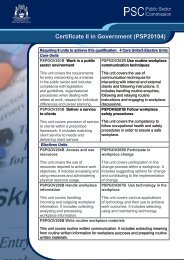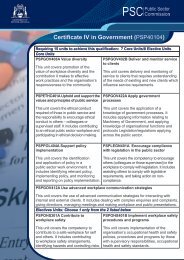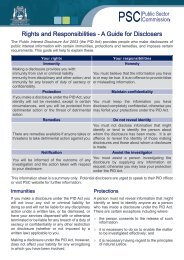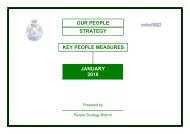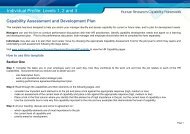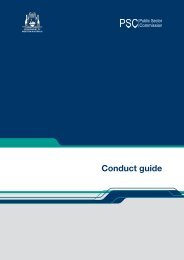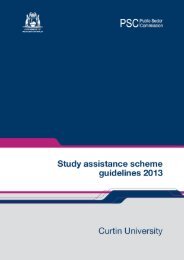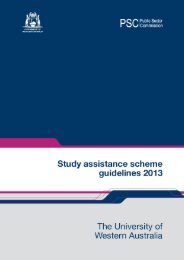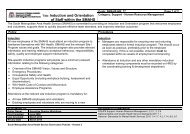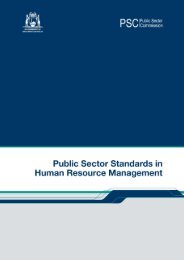Archived document - Public Sector Commission - The Western ...
Archived document - Public Sector Commission - The Western ...
Archived document - Public Sector Commission - The Western ...
Create successful ePaper yourself
Turn your PDF publications into a flip-book with our unique Google optimized e-Paper software.
e-Government Strategy for the <strong>Western</strong> Australian <strong>Public</strong> <strong>Sector</strong><br />
Foreword<br />
2<br />
Late last year my Department released a Strategic Planning Framework<br />
for the <strong>Western</strong> Australian <strong>Public</strong> <strong>Sector</strong>. <strong>The</strong> title, Better Planning: Better<br />
Services, expressed the focus of the strategy – to enhance the operations<br />
of government through the integrated delivery of more effective services to<br />
the community.<br />
Since coming to office, this Government has demonstrated its commitment<br />
to an ‘integrative approach’ to governance within <strong>Western</strong> Australia. <strong>The</strong><br />
Machinery of Government Taskforce has made a series of fundamental<br />
recommendations to change the way in which the public sector is organised<br />
and to achieve much more with the resources that we have.<br />
<strong>The</strong>se recommendations have already had significant impact across<br />
government. Prime examples include the merger of many government<br />
agencies and the establishment of the Shared Service Centres initiative by<br />
the Functional Review Implementation Team (FRIT).<br />
However, planning for a coordinated, cohesive and holistic delivery of public<br />
services is complex and takes time. <strong>The</strong> process does not stop here -<br />
it is ongoing.<br />
<strong>The</strong> e-Government Strategy for the <strong>Western</strong> Australian <strong>Public</strong> <strong>Sector</strong> seizes<br />
the opportunity for building on the progress already made in drawing<br />
agencies closer together, and it recognises the need to nurture a<br />
continuous process of integration across government.<br />
<strong>The</strong> experiences of governments around the world, within Australia and<br />
amongst our own <strong>Western</strong> Australian <strong>Public</strong> <strong>Sector</strong> shows us that<br />
Information and Communications Technologies (ICT) can be a vital tool in<br />
redesigning the way in which agencies work together and deliver better<br />
services to the public.<br />
Some examples of successful e-government initiatives already being<br />
progressed in <strong>Western</strong> Australia include:<br />
• EAS2 (Electronic Advice of Sale) - a partnership between the <strong>Western</strong><br />
Australian Department of Land Information, the Office of State Revenue<br />
and the Water Corporation. EAS2 enables conveyancers around the State<br />
to conduct advice of sale enquiries, lodge enquiries and receive rate and<br />
tax information online. This enhances the accuracy of information,<br />
minimises manual tasks, reduces turnaround time for enquiries and<br />
improves efficiencies through the electronic transmission of data.<br />
• e-Briefs is a joint <strong>Western</strong> Australian Police Service and Department of<br />
Justice initiative that enables the secure electronic exchange of Police<br />
complaints to the courts and the transmission of court results to the<br />
Police. e-Briefs now facilitates the processing of up to 90 per cent<br />
of prosecutions.<br />
• Tourism e-Marketplace is a one-stop shop for consumers, industry and<br />
media representatives. It is designed to enhance the <strong>Western</strong> Australian<br />
Tourism <strong>Commission</strong>’s online presence and showcase the products,<br />
information, services and resources related to tourism in <strong>Western</strong> Australia.<br />
• Shared Land Information Platform (SLIP) represents the development of<br />
a single web based access platform for all land and property information<br />
across government. SLIP incorporates shared spatial information<br />
infrastructure, hosting services and shared decision support tools.<br />
<strong>Western</strong> Australians have a growing expectation that government will<br />
deliver quality services tailored to their needs. <strong>The</strong> fundamental challenge<br />
for the public sector is to engage in a process of ‘re-engineering’ to address<br />
not only how services will be delivered more efficiently, but how the<br />
machinery of government will operate in an e-government environment.



